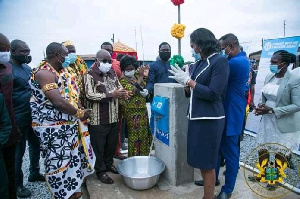President Nana Addo Dankwa Akufo-Addo has commissioned two water systems in the Central Region under the Additional Financing Sustainable Rural Water and Sanitation Project (AF-SRWSP).

They are the Anomansa Cluster Water System, which would provide potable water to more than 7,000 residents from 19 communities in the Mfantseman Municipality and Papase Cluster Water System, expected to benefit more than 48,000 people from 15 communities in the Awutu Senya West District.
The AF-SRWSP is a 45.7 million dollar World Bank credit facility aimed at expanding access and ensuring sustainable water supply and sanitation services to rural and small town communities in eleven regions of the country.
Under the AF-SRWSP, nine community water systems, costing over GH¢73 million, have been added to the existing 17 in the Central Region to increase water coverage from 63 to 70 per cent.
More than 187,000 people from 146 communities in eight districts of the Region would benefit from the project, which started in 2017 and completed in March, 2020.
Speaking at separate ceremonies to commission the facilities, President Akufo-Addo said their completion was a manifestation of Government’s commitment to increasing water for all.
The Government would not relent in its efforts to achieve parity in water supply, he said.
The President was confident that the water systems would go a long way to help the country achieve the Sustainable Development Goal Six, which demanded that every household be provided with potable water supply and sanitation.
Additionally, Government had secured funding for the construction of two community water projects to increase access to potable water to 150 rural communities in the Ashanti, Eastern, Greater Accra, Oti and Volta regions, while contract had been awarded for the construction of 654 mechanised boreholes across the country.
President Akufo-Addo encouraged investors to take advantage of the regular supply of water in the beneficiary communities and leverage on government’s flagship programmes to establish small and medium enterprises to provide employment and ensure growth and development.
He admonished the people to maintain the water facilities, which had come at a significant expense to the taxpayer.
Mrs Cecilia Abena Dapaah, the Minister of Sanitation and Water Resources, noted that the facilities would not only ease the daily burden on women and children of having to search for water but would also help to retain many children, especially girls, in school.
Mr Pierre Frank Laporte, the World Bank Country Director, said the Bank had supported the Water and Sanitation sector with several projects over the years and that Water, Sanitation and Health (WASH) project was critical in this COVID-19 pandemic.
The facilities would greatly enhance hand washing and sanitation practices to defeat the pandemic.
He assured of the World Bank’s continued support to Ghana with long term sustainability of infrastructure provided for water, sanitation and hygiene to ensure provision of free potable water to its citizens.
Engineer Worlanyo Kwadjo Siabi, the Chief Executive Officer of the Community Water and Sanitation Agency (CWSA), explained that the AF-SRWSP was designed with focus on finding solutions to the many water quality challenges faced by rural communities.
He said the CWSA, therefore, collaborated with the Ghana Water Company Limited to pump excess water from its treatment centres to supply the beneficiary communities.
Over 565 kilometres of transmission and distribution pipes were laid, seven booster stations constructed with two of them being hybrid, nine water management offices, eleven tanks and 403 stand pipes were constructed in addition to 6,118 household latrines.
He said the CWSA had deployed its technical staff to the clusters to ensure proper management of the facilities to provide uninterrupted potable water supply.
To ensure increased access and availability to rural communities within the catchment areas, Mr Siabi said smart taps had been installed where people could access water through tokens.
Source: GNA
 Home Of Ghana News Ghana News, Entertainment And More
Home Of Ghana News Ghana News, Entertainment And More




